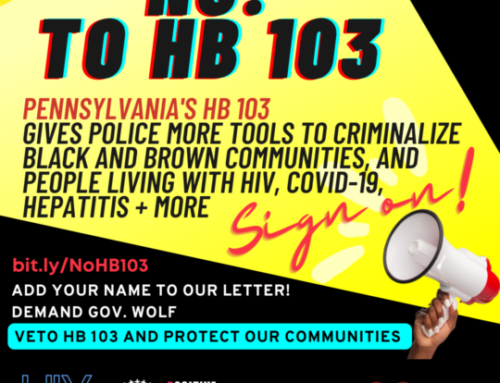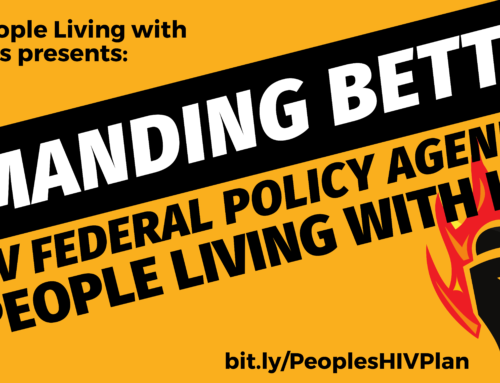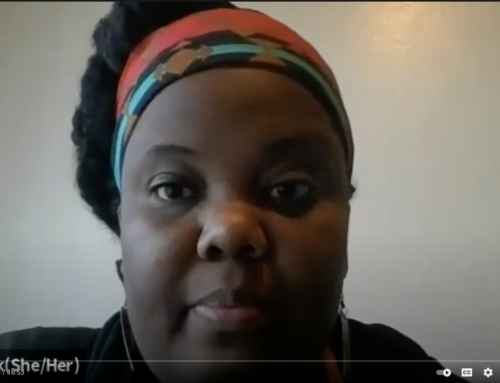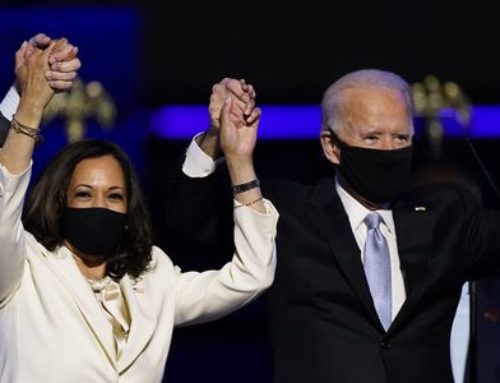**FOR IMMEDIATE RELEASE**
Contacts: JD Davids, jdavids13(at)gmail.com, +1.646.431.7525
Jennie Smith-Camejo, jsmithcamejo(at)pwn-usa.org, +1.347.553.5174
Cecilia Chung, cecilia(at)transgenderlawcenter.org, +1.415.902.0216
George Ayala, gayala(at)mpactglobal.org, +1.213.268.1777
Activists’ Call to Move AIDS 2020 Out of United States Gains Steam
From the podium to the street, researchers, health care providers, sex workers and others call for action; #AIDS2020ForAll offers support to IAS on exit challenges
Amsterdam, Netherlands, July 26: At AIDS 2018–the massive, biannual International AIDS Conference taking place in Amsterdam this week–one of the most-heard conversations is actually about 2020. Activists from around the world, including every network of people living with HIV in the U.S., are calling on the conference’s sponsor, the International AIDS Society (IAS), to change their plans to hold their 2020 conference in the United States.
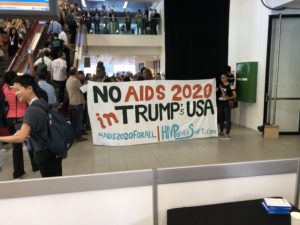 AIDS 2020 For All–a coalition of people living with HIV, HIV activists and allies pushing to move the conference–has repeatedly offered to support the IAS in navigating the potential challenges of moving the massive conference. Meanwhile, they have continued to engage in direct action at AIDS 2018 all week to raise awareness of the horrifying realities that endanger the conference plans and would-be participants, imploring conference organizers to pivot rather than continuing to defend their plans.
AIDS 2020 For All–a coalition of people living with HIV, HIV activists and allies pushing to move the conference–has repeatedly offered to support the IAS in navigating the potential challenges of moving the massive conference. Meanwhile, they have continued to engage in direct action at AIDS 2018 all week to raise awareness of the horrifying realities that endanger the conference plans and would-be participants, imploring conference organizers to pivot rather than continuing to defend their plans.
“No AIDS conference in Trump’s America. Change the host!” chanted activists, including Ceyenne Doroshow, founder and executive director of GLITS, an LGBT sex worker rights organization, which interrupted a torch lighting ceremony in the conference’s global village to raucous applause. Minutes later, plenary speaker Dr. David Malebranche, MD, MPH, of Morehouse School of Medicine opened his speech with a slide endorsing the call to move the conference, saying, “We know the policies in the United States will make it inhospitable for folks coming to San Francisco in 2020, so make your voices heard with regard to the possibility of changing the city.”
The U.S. government bans the entry of sex workers and people who use drugs; has criminalized immigrants and detained activists at airports; has denied HIV care to people in prison and immigrant detention centers, resulting in the death of those in custody; and has seen massive increases in white supremacist violence that are expected to peak in 2020 during a contentious presidential race. Recently, the Trump administration directed that as of October 2018, the U.S. military will discharge all people diagnosed with HIV from service.
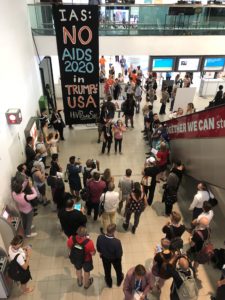 On Tuesday, the first full day of the conference, activists staged a guerrilla press conference, featuring speakers from every single national U.S.-based network of people living with HIV, in addition to networks of youth living with HIV from Brazil and Mexico, sex worker organizations, MPact Global Action for Gay Men’s Health and Rights, transgender advocacy groups, and large HIV service providers.
On Tuesday, the first full day of the conference, activists staged a guerrilla press conference, featuring speakers from every single national U.S.-based network of people living with HIV, in addition to networks of youth living with HIV from Brazil and Mexico, sex worker organizations, MPact Global Action for Gay Men’s Health and Rights, transgender advocacy groups, and large HIV service providers.
“It should be inconceivable that the International AIDS Society would even consider a bid from a country where absolutely zero of the networks of people living with HIV are supporting the conference coming. Who is this conference actually for?” asked Naina Khanna, executive director of Positive Women’s Network – USA, a national advocacy organization of women living with HIV.
Since the press conference, thousands of AIDS 2018 participants in Amsterdam have joined U.S. networks of people living with HIV and other affected communities worldwide, saying they could not or would not attend a conference controlled by an administration so hostile to the rights of HIV-affected communities.
Although IAS itself has not issued any statement about the growing AIDS 2020 controversy, members of their own governance body have called for individuals to speak up. Yesterday, at a press conference, new IAS governing council member Keletso Makofane stated, “I share the concerns that folks have been voicing about access to the conference… I’m not on the council yet and it hasn’t been put to the council but when it is put to the council, if it is put to the council, there will be robust debate within the council and it will be very important for folks outside the council to continue to communicate their concerns vociferously, but also to have a dialogue with the council. I think that might help to move things forward.”
Later that day, Kathie Hiers of AIDS Alabama, a member of the AIDS 2020 Conference Coordinating Committee, spoke up at a meeting to remind colleagues that she signed on to a letter earlier this year opposing the selection of a U.S.-based site, and remains opposed to the IAS decision. George Ayala, executive director of MPact Global Action for Gay Men’s Health and Rights committed to partnering with other global key population networks to plan an alternative conference outside the US in 2020 if AIDS 2020 is not moved.
Statements and protests have continued throughout the week. Jonathan Cohen of Open Society Foundations (OSF) spoke during a symposium entitled “Civil Society Under Threat,” asking, “What message are you sending… by forcing people to choose between staying home from this conference and disclosing their drug use or ‘crime of moral turpitude’?” He went on to implore, “IAS, please do what these governments do not do: Meet with communities, hear their voice. Before the week ends, convene an emergency town hall about AIDS 2020.”
At yesterday’s press conference for the launch of the Expert Statement on HIV Science in the Context of Criminal Law, Edwin Bernard, director of HIV Justice Worldwide called the U.S. “not a safe place for people” with HIV, urging the organizers to reconsider their decision: “HIV criminalization is part of a much larger problem of the current and former administration of the US, controlling and punishing bodies, of people who are different than those in the ruling classes. And things are only getting worse…There is of course disproportionate impact of these prosecutions on people who are marginalized, people of color, sex workers, trans people.”
As of Thursday evening, IAS has not made a public statement addressing the controversy.
###



